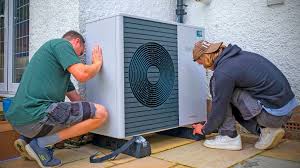
The Environmental Impact of Heat Pumps
Heat pumps are gaining popularity as an efficient alternative to traditional cooling and heating systems, but their environmental impact is a crucial aspect to take into consideration. These devices work by transferring heat, rather than creating heat pump (tepelné čerpadlo) through combustion, which can lead to considerable reductions in emissions of greenhouse gases as well as consumption of energy.
How Heat Pumps Work
Heat pumps operate on a simple principle: they move heat from one location to another rather than making them from scratch. In winter, they extract heat from the outdoors air, ground or water and transfer it indoors. In summer it reverses the process by removing heat from the indoor space and releasing it outdoors. This process is completely different from the traditional methods that burn fossil fuels to produce heat.
Energy Efficiency
One of the biggest benefits for heat pump is its effectiveness. They can supply three times the amount of heat energy to a home than the electrical energy they consume. The efficiency can be measured using the coefficient of performance (COP), which measures the amount of heat generated for every watt of electricity used. A typical heat pump has a COP of approximately 3, which means it produces three times as much heat as the energy it consumes.
Reduction in Greenhouse Gas Emissions
Utilizing electricity instead of fossil fuels, heat pumps are able to lower greenhouse gas emissions. The true environmental benefit is dependent in the location of electricity that powers the heating system. In areas where the grid is powered primarily through renewable energies The reduction in emissions can be substantial. However, in those areas that generate electricity primarily from coal or other fossil fuels, the advantages are less pronounced but still there.
Environmental Considerations
Although heat pumps are generally ecologically sustainable, they aren’t free of environmental issues. The refrigerants used in heat pumps could be extremely greenhouse gases when they are released. Modern systems utilize less harmful refrigerants however, proper maintenance is vital to reduce the chance of leaks.
Additionally, the production and removal of heat pumps leave an environmental impact. Manufacturing is a process that requires resource extraction and energy consumption, and getting rid of them requires careful handling to avoid the environmental harm.
Conclusion
Heat pumps represent a promising method of decreasing the use of energy and greenhouse emissions of gases. Their efficiency and capacity to use renewable energy makes them a greener alternative to conventional heating and cooling systems. However, to maximize their environmental impact, it is crucial to consider issues relating to the management of refrigerants and the lifecycle impact. With continued advancements in technology and a shift towards cleaner energy sources heating systems are likely to become a more sustainable choice for homeowners seeking to reduce their environmental impact.